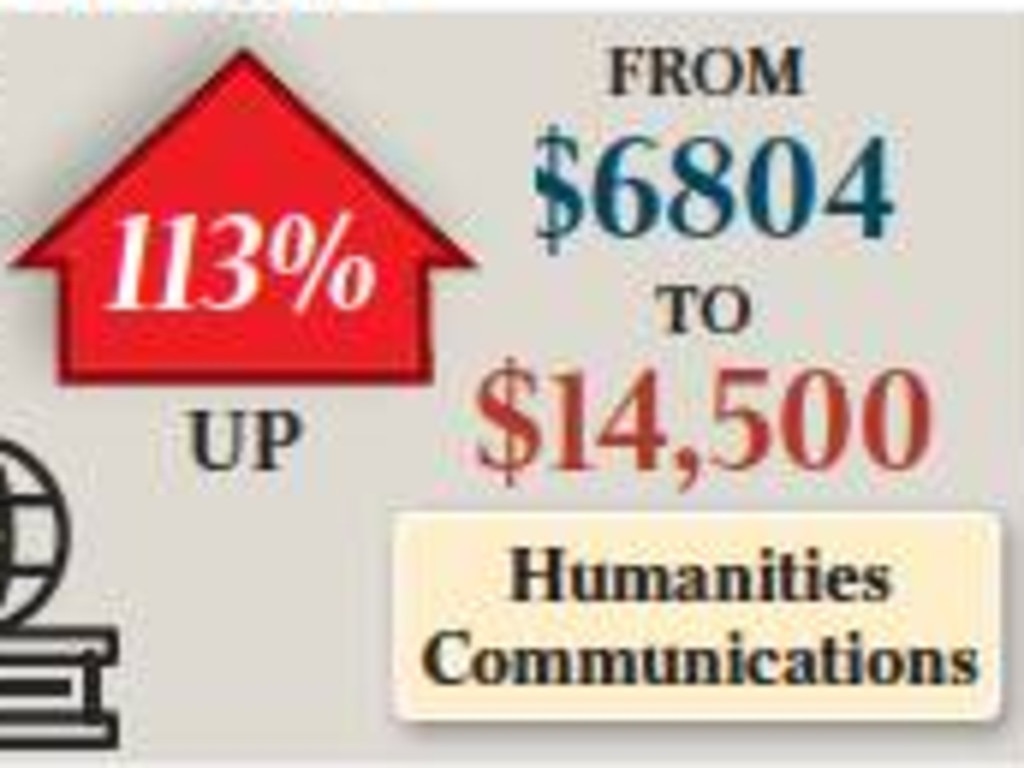Uni fee shake-up: Explosion of degrees has sapped their value


Want to spent three years reading Foucault and dreaming about vandalising Captain Cook statues? Fine, but don’t expect a cent from taxpayers.
The government’s plans to reform university fees, hiking them dramatically for humanities courses and slashing them for science, agriculture and nursing, will encourage students to enrol in courses deemed more vocationally relevant.
However arbitrary and debatable those classifications — psychology courses are in the group whose fees will drop (?) — taxpayers have every right to make judgements about the extent of support for particular courses, especially now.

The coronavirus pandemic has made us poorer so we can’t afford to lavish so much on subjects unlikely to deliver a private return to the individual, let alone a social one.
Graduates in queer and diversity studies, for instance, struggle to pay back taxpayer support, suggesting their time spent at university was more a form of consumption than investment.
The government’s reforms signal the victory of one principle of higher education funding over another.
The first, that students likely to earn more should pay more, would see lower fees for Arts and higher fees for IT and engineering.
Yet fees for the latter group would drop 21 per cent, while the those for Arts courses would rise as much as 113 per cent.
The second principle, that subjects with the highest social return should receive more funding, appears to be winning out.

Even though, medicine, dentistry and engineering courses will see lower fees or no change, graduates of such disciplines typically earn more than a creative arts graduate, even one with first class honours, who would be paying more.
In a different era, the case for publicly subsidising humanities was much stronger. Study of philosophy and literature, for instance, would leave students more worldly, literate and tolerant.
Today, they tend to leave them angry, narrow-minded, and unemployed, and obsessed with viewing everything through the simplistic prism of race, sexuality and gender. The Left lost the economic arguments comprehensively when the Soviet Union collapsed, but their rear guard action in the academy has been highly successful.
The government’s reforms ignore a deeper problem.
Our obsession with producing credentials has become a huge drain on our resources, which enriches only the education sector itself.
For students universities have become mechanisms to signal one’s ability to future employers, rather than places to acquire knowledge for its own sake.

Employers can’t simply ask job candidates how good they are, so applicants must produce pieces of paper.
For the individual, getting a degree is like bringing a stool to a rock concert. You can get a better view for a while, but once everyone starts doing it you’re no better off yet still have to pay for the stool.
Students with degrees earn more than those without them, but that has little to do with what they have actually learned at university. Anyone can sit in university lectures, for free, but without the piece of paper at the end, it’s all, vocationally speaking, a waste of time.

Government can pass all the laws it wants but the quantum and distribution of intelligence is more or less fixed.
Just as printing currency devalues money, the explosion of degrees has sapped their value, which compels the brighter students to toil away at university obtaining more and more credentials, delaying their ultimate contribution to the economy and society.
The government’s reforms have merit but reversing Labor’s decision to uncap places would be a sensible next step.







If tearing down statues is the thanks taxpayers get from tipping millions of dollars of subsidies into critical theory courses at university, it’s about time we stop chipping in.